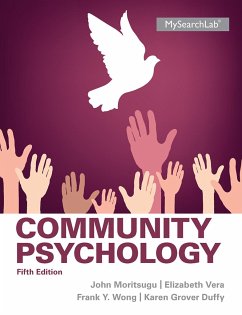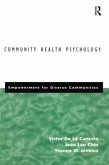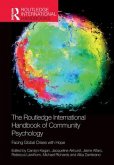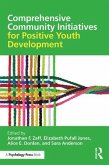The concepts, research and applications emerging from the field of community psychology.
Community Psychology, 5/e focuses on the prevention of problems, the promotion of well-being, empowerment of members within a community, the appreciation of diversity, and an ecological model for the understanding of human behavior. Attention is paid to both “classic” early writings and the most recent journal articles and reviews by today’s practitioners and researchers. Historical and alternative methods of effecting social change are explored in this book, with the overall theme that the environment is as important as the individual in it.
This text is available in a variety of formats – print and digital. Check your favorite digital provider for your etext, including Coursesmart, Kindle, Nook, and more. To learn more about our programs, pricing options and customization, click the Choices tab.
Learning Goals
Upon completing this book, readers will be able to:
Understand the historical and contemporary principles of community psychology.
Apply theory and research to social services, mental health, health, legal, and public health systems
Product Description
The concepts, research and applications emerging from the field of community psychology.
Community Psychology, 5/e focuses on the prevention of problems, the promotion of well-being, empowerment of members within a community, the appreciation of diversity, and an ecological model for the understanding of human behavior. Attention is paid to both “classic” early writings and the most recent journal articles and reviews by today’s practitioners and researchers. Historical and alternative methods of effecting social change are explored in this book, with the overall theme that the environment is as important as the individual in it.
This text is available in a variety of formats – digital and print. Pearson offers its titles on the devices students love through Pearson’s MyLab products, CourseSmart, Amazon, and more.
Learning Goals
Upon completing this book, readers will be able to:
Understand the historical and contemporary principles of community psychology.
Apply theory and research to social services, mental health, health, legal, and public health systems
0205961088 / 9780205961085 Community Psychology Plus MySearchLab with Pearson eText -- Access Card Package
Package consists of:
0205239927 / 9780205239924 MySearchLab with Pearson eText -- Valuepack Access Card
0205255620 / 9780205627714 Sociology of Mental Disorder
Features + Benefits
Opening vignettes and Case in Point sections – Draw students into the material by arousing curiosity and demonstrating how the theory and research may be practically applied.
Introductory Chapter – The emphasis on history and context for the development of the field has been reinforced. The student is provided with the example of community psychology’s development as an effort at social change.
Ethnic minority and cultural research -- references and examples are used throughout the text.
Final Chapter – Acknowledges the globalization of the field, and includes authors from around the world.
Discussion of areas for community work – The student may see the field in development and gain a sense of relevancy to the world unfolding before them.
Emphasis on social change – And on the systems in which community psychology can be applied. Among these systems are those addressing mental health, education, criminal justice, social services, work, and public health.
Tables and graphs – help to highlight points; students may see as well as read examples of community data illustrated.
MySearchLab with Pearson eText - A collection of tools and resources that can help students in any course. MySearchLab is designed with one single purpose - to improve the academic success of all higher education students, one student at a time. MySearchLab contains a Pearson eText and research/writing tools:
Pearson eText - Just like the printed text, students can highlight relevant passages and add their own notes. For even greater flexibility, students can download the eText to an tablet using the free Pearson eText app.
Research and writing tools - Access to various academic journals, census data, Associated Press news feeds, and discipline-specific readings. Also, a wide range of composition and grammar tools aid students throughout the writing process, helping them to produce more effective papers.
BRIEF TABLE OF CONTENTS:
Chapter 1: Introduction to Community Psychology
Chapter 2: Scientific Research Methods
Chapter 3: Stress, coping social support and Resilience
Chapter 4: The Importance of Social Change
Chapter 5: Community Intervention Strategies
Chapter 6: The mental health System
Chapter 7: Social and Human Services in the Community
Chapter 8: Schools, Children, and Communities
Chapter 9: Law, Crime, and The Community
Chapter 10: The Health Care System
Chapter 11: Community Health and Preventive Medicine
Chapter 12: Community/Organizational Psychology
Chapter 13: The Future of Community Psychology
Community Psychology, 5/e focuses on the prevention of problems, the promotion of well-being, empowerment of members within a community, the appreciation of diversity, and an ecological model for the understanding of human behavior. Attention is paid to both "classic" early writings and the most recent journal articles and reviews by today's practitioners and researchers. Historical and alternative methods of effecting social change are explored in this book, with the overall theme that the environment is as important as the individual in it. This text is available in a variety of formats - digital and print. Learning Goals Upon completing this book, readers will be able to: Understand the historical and contemporary principles of community psychology. Apply theory and research to social services, mental health, health, legal, and public health systems
Hinweis: Dieser Artikel kann nur an eine deutsche Lieferadresse ausgeliefert werden.
Community Psychology, 5/e focuses on the prevention of problems, the promotion of well-being, empowerment of members within a community, the appreciation of diversity, and an ecological model for the understanding of human behavior. Attention is paid to both “classic” early writings and the most recent journal articles and reviews by today’s practitioners and researchers. Historical and alternative methods of effecting social change are explored in this book, with the overall theme that the environment is as important as the individual in it.
This text is available in a variety of formats – print and digital. Check your favorite digital provider for your etext, including Coursesmart, Kindle, Nook, and more. To learn more about our programs, pricing options and customization, click the Choices tab.
Learning Goals
Upon completing this book, readers will be able to:
Understand the historical and contemporary principles of community psychology.
Apply theory and research to social services, mental health, health, legal, and public health systems
Product Description
The concepts, research and applications emerging from the field of community psychology.
Community Psychology, 5/e focuses on the prevention of problems, the promotion of well-being, empowerment of members within a community, the appreciation of diversity, and an ecological model for the understanding of human behavior. Attention is paid to both “classic” early writings and the most recent journal articles and reviews by today’s practitioners and researchers. Historical and alternative methods of effecting social change are explored in this book, with the overall theme that the environment is as important as the individual in it.
This text is available in a variety of formats – digital and print. Pearson offers its titles on the devices students love through Pearson’s MyLab products, CourseSmart, Amazon, and more.
Learning Goals
Upon completing this book, readers will be able to:
Understand the historical and contemporary principles of community psychology.
Apply theory and research to social services, mental health, health, legal, and public health systems
0205961088 / 9780205961085 Community Psychology Plus MySearchLab with Pearson eText -- Access Card Package
Package consists of:
0205239927 / 9780205239924 MySearchLab with Pearson eText -- Valuepack Access Card
0205255620 / 9780205627714 Sociology of Mental Disorder
Features + Benefits
Opening vignettes and Case in Point sections – Draw students into the material by arousing curiosity and demonstrating how the theory and research may be practically applied.
Introductory Chapter – The emphasis on history and context for the development of the field has been reinforced. The student is provided with the example of community psychology’s development as an effort at social change.
Ethnic minority and cultural research -- references and examples are used throughout the text.
Final Chapter – Acknowledges the globalization of the field, and includes authors from around the world.
Discussion of areas for community work – The student may see the field in development and gain a sense of relevancy to the world unfolding before them.
Emphasis on social change – And on the systems in which community psychology can be applied. Among these systems are those addressing mental health, education, criminal justice, social services, work, and public health.
Tables and graphs – help to highlight points; students may see as well as read examples of community data illustrated.
MySearchLab with Pearson eText - A collection of tools and resources that can help students in any course. MySearchLab is designed with one single purpose - to improve the academic success of all higher education students, one student at a time. MySearchLab contains a Pearson eText and research/writing tools:
Pearson eText - Just like the printed text, students can highlight relevant passages and add their own notes. For even greater flexibility, students can download the eText to an tablet using the free Pearson eText app.
Research and writing tools - Access to various academic journals, census data, Associated Press news feeds, and discipline-specific readings. Also, a wide range of composition and grammar tools aid students throughout the writing process, helping them to produce more effective papers.
BRIEF TABLE OF CONTENTS:
Chapter 1: Introduction to Community Psychology
Chapter 2: Scientific Research Methods
Chapter 3: Stress, coping social support and Resilience
Chapter 4: The Importance of Social Change
Chapter 5: Community Intervention Strategies
Chapter 6: The mental health System
Chapter 7: Social and Human Services in the Community
Chapter 8: Schools, Children, and Communities
Chapter 9: Law, Crime, and The Community
Chapter 10: The Health Care System
Chapter 11: Community Health and Preventive Medicine
Chapter 12: Community/Organizational Psychology
Chapter 13: The Future of Community Psychology
Community Psychology, 5/e focuses on the prevention of problems, the promotion of well-being, empowerment of members within a community, the appreciation of diversity, and an ecological model for the understanding of human behavior. Attention is paid to both "classic" early writings and the most recent journal articles and reviews by today's practitioners and researchers. Historical and alternative methods of effecting social change are explored in this book, with the overall theme that the environment is as important as the individual in it. This text is available in a variety of formats - digital and print. Learning Goals Upon completing this book, readers will be able to: Understand the historical and contemporary principles of community psychology. Apply theory and research to social services, mental health, health, legal, and public health systems
Hinweis: Dieser Artikel kann nur an eine deutsche Lieferadresse ausgeliefert werden.








